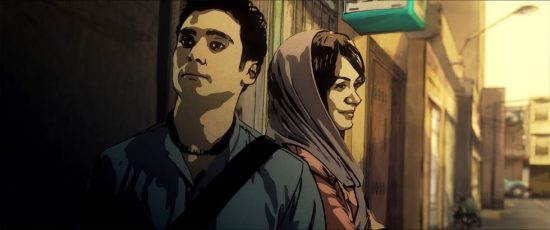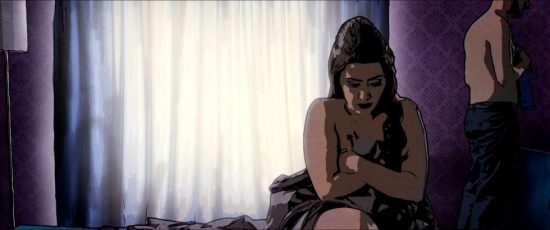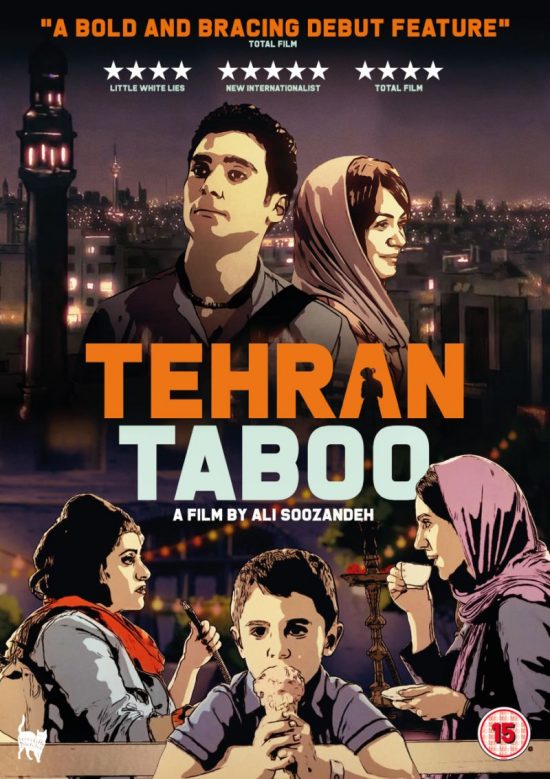Review: Tehran Taboo – “A glimpse into a society most of us don’t see in cinema”
Pari (Elmira Rafizadeh) is a single mother in Tehran, struggling to look after her mute young son Elias (Bilal Yasar), while her worthless husband is in jail on a drugs charge, and refusing continually to sign consent forms for a divorce to let her go free. Meantime she is forced into sex work to try and make ends meet, leading to a pretty interesting opening scene in Ali Soozandeh’s intriguing look at the sides of life in modern Tehran that the religious rulers of that country like to pretend only exist in morally corrupt other societies, but of course regardless of what supposed standards they might claim exist people are people in any city anywhere.
We first see Pari being picked up by a middle-aged man cruising the streets; soon she is in his car (her young son in the back, as she has no-one to look after him), and her John is haggling over price (Pari is pretty good at standing up for herself), until she tells him firmly the best he is getting for that money is fellatio. This proceeds as the car is driving through a busy evening in the city and any hints of exploitation or titillation are quickly dispelled between, shall we say, performance issues for the John, then he catches sight of a young woman walking the busy night-time streets with a boyfriend. He realises it is his own daughter and moves to Indignant Protective Dad mode (despite having Pari’s head in his lap), the boy is – gasp – holding her hand! “Pervert!” he shouts. Raising her head from his groin Pari can’t help but comment “look who’s talking.”
This very much sets the tone for Soozandeh’s film – looking at the intimate, hidden sides of life (in a society where unwed couples holding hands in public can be arrested for indecency), but doing so with a nicely irreverent touch (not so much broad comedy, more the sort of humour that just often comes out of situations in everyday life). The film follows several characters like Pari, Sara (Zahra Amir Ebrahimi), the daughter-in-law of her neighbours in the new apartment she is moved into (the same judge who refuses to sign her divorce without the husband’s papers is happy to arrange to have her as a sexual partner on the side), and Babak (Arash Marandi), a young musician. Pari pretends her husband is a long-distance truck driver to explain his absence and that she works as a nurse, hence her regular night-time excursions, but they all have secrets to keep hidden.
We start to learn those secret lives in the individual strands, which then cross lines with Pari’s story throughout the film, a little like Short Cuts, all of which is delivered with Rotoscoping animation over the live actors, giving the film a very interesting visual style, like Waltz With Bashir or A Scanner Darkly. This approach allows for some interesting visuals – Babak, attempting to take an intimate phone call on the train where you never know who may be listening (and happy to report you to the religious police), turns towards the window, and the camera moves outside the carriage to look in at him on the other side of the window, or Pari and Sara having an evening out eating in an open-air cafe in a beautiful, colourfully-lit square at night, or a view from the apartment over an animated, nocturnal cityscape of Tehran.
Running throughout these tales of hidden lives and secrets is a strong theme of hypocrisy, of those standing up and pretending to be ultra-moral while content to indulge in any number of prescribed acts, most especially the men in positions of authority who continually try to control the women in society (they can do almost nothing without having a form signed by a husband or father), who act as if such moral “deviancy” is beneath them (one is reminded of the string of high profile televangelists in the US who condemn “sin” then we find out they’ve been indulging in endless extra-marital affairs and drugs).
It’s a theme that could have been delivered in a grimmer, darker fashion, but Soozandeh’s lighter touch manages to bring over these serious subjects (ones rarely discussed openly in such a conservative, highly monitored society) without wearing down the viewer; there are some upsetting and emotional scenes, but the humour of the everyday, and the satirical touches riffing on the hypocritical nature of a society pretending these problems only happen in decadent Western countries when in reality the same troubles happen to people, well, everywhere, no matter what any politician or religious leader likes to say. Peccadillo Pictures has a reputation for bringing us intriguing films from different countries, often dealing with hidden, moral, sexual or taboo subjects, and Tehran Taboo fits very nicely into their stable of films, with the added bonus of giving us a glimpse into a society most of us don’t see in cinema too often, from a very human, everyday life perspective.
Tehran Taboo is out now on DVD and VoD from Peccadillo Pictures.














